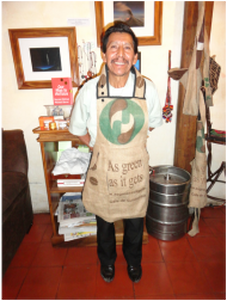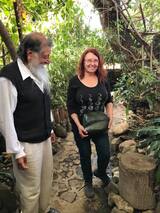
What is vertical integration? My students in Michigan State’s College of Business learn that vertical integration is a kind of management that involves uniting all of the operations in a supply chain through a single managing entity. Sometimes this goes even further such as when one owner controls all parts of the supply chain. An early example of this is the industrial giant Ford Motor Company, which began to make some of its own steel in the 1920s rather than buy it from suppliers. The clothing manufacturer American Apparel is a fashion manufacturer and retailer that is often used as an example of vertical integration in the twenty-first century.
Why is vertical integration a great idea for coffee farmers in Guatemala? Coffee farmers in Guatemala and other developing countries work long hours, often hiking an hour or more to reach their plots of land. According to human rights organization Global Exchange, farmers in Guatemala typically receive about thirty-five to forty cents per pound if they sell their coffee to intermediaries in Guatemala, traditionally the only market available to them for their crops. For those farmers who find ways to export directly to the international market, the price is sixty to seventy cents per pound. (See http://www.globalexchange.org/fairtrade/coffee/cooperatives#6.) Through AGAIG’s direct trade approach, the coffee sells for US $8.00/pound in Guatemala and the farmer receives every penny. It sells for $12.25 in the U.S. because of costs to ship to a distribution point in the U.S., but the farmer still receives approximately US $8.00 per pound. (See http://www.asgreenasitgets.org/shop/coffee/bags.html for mail order prices.) However, the $8 is not pure profit, because there are a lot of expenses involved in cultivating coffee. Nevertheless, it is a much more profitable business model as compared to conventional coffee trade. Moreover, it is based on the producers' existing lifestyles and skillsets. Adding wages and tips from work as a barista to the $8.00 per pound for coffee, each farmer is able to raise the standard of living for his or her family. For AGAIG families, this means money to send children to school; to replace the dirt floors in their homes with cement; and to build indoor bathrooms with sinks, toilets, and showers.
Copyright© 2012 by Paulette L. Stenzel for text and photo. Thank you to Stephen Kelly, J.D. Candidate, Boston College Law School, for editorial assistance.

 RSS Feed
RSS Feed